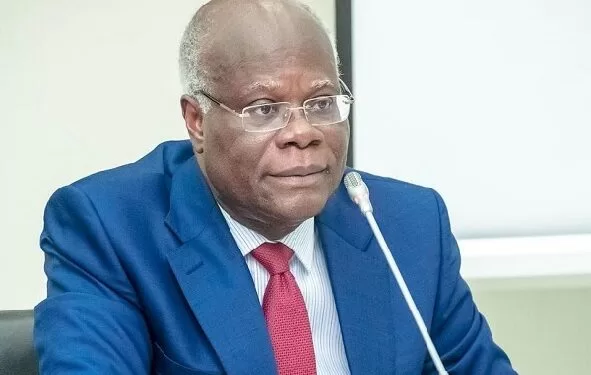Banking Consultant Dr. Richmond Atuahene has warned that banks operating in the country could face insolvency if the International Financial Reporting Standard (IFRS) 9 is applied strictly, following their participation in the Domestic Debt Exchange Programme (DDEP).
Already, there are indications that foreign-owned banks, including South Africa-based Standard Bank and First Rand Bank, are looking to recapitalising their Ghanaian arms, with the former being reported to have set aside 1.5 billion South African Rand (ZAR) – approximately US$81million – to cover potential losses emanating from the DDEP.
According to his analysis, contained in a paper titled ‘Assessing the Domestic Debt Exchange Programme and Fair Value Accounting Impact on Local Banks’ Solvency’, more than 30 percent – nine banks out of 23 – could go bust if the IFRS 9 is not temporarily suspended.
“From the data analyses, only the last six banks – R, S, T, U, V and W – may not experience any capital losses while eight banks may experience mild capital losses. These losses could be due to a combination of coupon or interest rate reduction and maturity extension with below-market coupon rates,” Dr. Atuahene explained in the paper co-authored with a financial consultant, K.B. Frimpong, which assigned letter A to W to correspond with respective banks.
He added that the capacity of the banking sector to absorb losses is low, and that without resorting to recapitalisation from the government or shareholders, local banks will not be able to absorb losses.
“Capital shortfalls are more likely to emerge for a tail of weak banks like A, B, E, D, G, J, K and few others because of their higher share of exposure to government domestic debt relative to their capital,” he said.
The central bank has issued regulatory forbearance on liquidity and solvency and standardised the accounting treatment regarding DDEP. Additionally, it has implemented measures, such as reducing the cash reserve requirement ratio to 12 percent on local currency deposits, reducing the capital conservation buffer to zero percent from 3 percent, slashing the capital adequacy ratio to 10 percent from 13 percent, and suspending dividend payments and other payouts to shareholders.
The Bank of Ghana is also spearheading the establishment of a GH¢15billion Financial Stability Fund, which is intended to serve as an additional layer of support for affected institutions, chief among them being banks.
Despite these measures, Dr. Atuahene warns that they may not be sufficient to prevent Ghana’s banking system from becoming insolvent. “The government and shareholders need to act fast to recapitalise the banks and protect the stability of the entire banking system and the economy. We cannot afford to take any chances”.
The banking consultant highlighted the potential impact of a domestic debt exchange on 23 banks’ balance sheets, as domestic banks hold around 37 percent of government securities.
He explained that any loss in value as a result of government debt exposures would lead to regulatory capital impairment in banking institutions at the time of the restructuring, unless these losses have already been absorbed by loan-loss provisioning and mark-to-market accounting, which were never applied before the restructuring.
Dr. Atuahene’s analysis showed that the reduction in the value of the government debt portfolio could be due to changes to the original contractual value of the debt security, such as coupon reduction from 19.3 percent to a weighted coupon rate of 9 percent, and maturity extension from five years to 15 years.
Using the net present value of GH¢41.32billion losses would negatively impact 23 banks’ solvency, with bank B estimated to become insolvent with NPV estimated losses of GH¢7.4billion from the total shareholders’ equity of GH¢2.85billion.
In light of these risks, the former lecturer at the National Banking College called for quick recapitalisation from the government and shareholders to mitigate the risk, and protect the stability of the entire banking system and the economy.
“If we allow losses to take their course, then the solvency of the banking system is at stake. We can’t afford to have our banking system become insolvent. We need to recapitalise the banks as quickly as possible so that they can continue to play their role in the economy,” he told the B&FT.
The banking consultant’s warning comes as discomfort persists in the industry over the DDEP as vestiges of the financial sector clean-up remain.
As part of reforms at the time, the Bank of Ghana tightened rules for lenders after a series of collapses and bail-outs, including increasing the minimum capital requirement for banks to GH¢400million by the end of 2018, from GH¢120million.
IFRS 9 specifies how an entity should classify and measure financial assets, financial liabilities, and some contracts to buy or sell non-financial items.
It requires an entity to recognise a financial asset or a financial liability in its statement of financial position when it becomes party to the contractual provisions of the instrument. At initial recognition, an entity measures a financial asset or a financial liability at its fair value plus or minus – in the case of a financial asset or a financial liability not at fair value through profit or loss – transaction costs that are directly attributable to the acquisition or issue of the financial asset or the financial liability.

 Politics1 week ago
Politics1 week ago
 Business3 days ago
Business3 days ago
 Business3 days ago
Business3 days ago
 Health3 days ago
Health3 days ago
 Sports3 days ago
Sports3 days ago
 Politics3 days ago
Politics3 days ago
 Entertainment3 days ago
Entertainment3 days ago
 Business3 days ago
Business3 days ago







